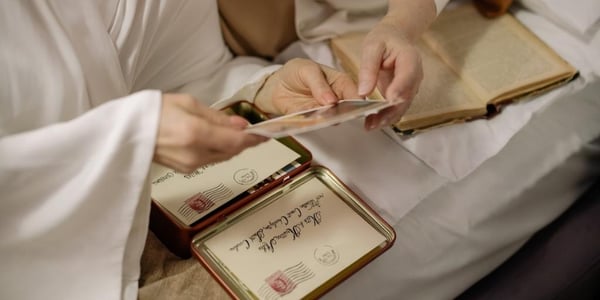Travel offers a chance for families to break free from the ordinary and embark on a shared...
Discovering Your Roots: 11 Ways To Connect With Your Heritage
Staying connected to our roots is important not only for our own personal identity but also for passing on traditions and values to future generations. Moreover, maintaining a strong connection to their cultural heritage can provide a sense of belonging and purpose. It can also improve mental and emotional well-being.
Fortunately, there are many ways to stay connected with your heritage, regardless of where you live or your level of mobility. From learning the language to attending cultural festivals, there are a variety of activities that can help you gain a greater understanding of your culture and feel more connected to your community. In this article, we will explore some of the best ways to stay connected with your heritage and how these activities can provide a sense of belonging and meaning in your life.
1. Create a Family Tree
Creating a family tree is a great way to explore your ancestry and learn more about your family's history. It's also a fun and engaging activity that people of all ages can enjoy. By tracing your family's roots, you can discover fascinating stories and connections that you never knew existed.
To get started, gather information from family members, such as names, dates of birth and death, and locations of birth and death. You can then use online tools or genealogy software to create a family tree that maps out your ancestry. As you add to your family tree, you may discover interesting facts or stories you can share with younger generations. By creating a family tree, you can connect with your heritage and pass on your family's history to future generations.
2. Watch Movies and Documentaries
Watching movies and documentaries about your culture can be a great way to learn more about your heritage and ancestors' experiences. Whether it's a historical documentary, a cultural film, or a classic movie from your culture, watching these films can provide a window into the world of your ancestors.
You can seek out films and documentaries online or in local libraries or cultural centers. You may also want to attend film festivals or screenings of films from your culture. Watching these films can provide a shared experience that can be enjoyed by multiple generations. Watching movies and documentaries make it easy to connect with your heritage and pass on your cultural traditions to future generations.
3. Celebrate Cultural Holidays
Celebrating cultural holidays can be a meaningful way to stay connected with your heritage and share your traditions with younger generations. Each culture has unique traditions and holidays worth celebrating, from religious holidays to national holidays and everything in between. By participating in cultural holidays, you can learn more about your culture's history and values and feel a sense of pride in your heritage.
To celebrate cultural holidays, you can participate in local cultural events, attend religious services, or create your own traditions with family and friends. It's also a good idea to involve younger generations in the celebration, teaching them about the traditions and values associated with the holiday and encouraging them to participate in the festivities. By passing on these traditions to future generations, you can help keep your culture alive for years to come.
4. Cook Traditional Foods
Food is an essential part of many cultures, and cooking traditional dishes is a great way to stay connected with your heritage. Whether it's a recipe passed down through generations or a dish you remember from childhood, preparing and sharing traditional foods with loved ones can help keep cultural traditions alive. Cooking traditional foods can also be a fun and creative activity that can bring people together and create memories.
To get started, you can find traditional recipes online, in cookbooks, or from family members. It's important to remember that traditional recipes may require specific ingredients or techniques, so it's a good idea to do some research and preparation before you begin. You can also involve family members or friends in the cooking process, making it a social activity that can bring people closer together.
5. Use Social Media to Connect with Others
Social media provides a powerful tool for connecting with others who share your cultural heritage, no matter where they are in the world. By joining online communities, you can share information, experiences, and traditions with others who understand and appreciate your culture.
To get started, you can search for online communities on social media platforms such as Facebook or Twitter, or join online forums or groups related to your culture. You may also want to follow cultural organizations or influencers who share your interests. By engaging with others on social media, you can share your experiences and learn from others with similar experiences.
6. Travel to Your Ancestral Homeland
Traveling to your ancestral homeland can be a life-changing experience. It's an opportunity to connect with your roots and explore the culture and traditions of your ancestors. Visiting your ancestral homeland can also provide a sense of closure and belonging that can be hard to find elsewhere.
Before traveling, it's essential to do your research and plan your trip carefully. You'll want to learn about the customs, language, and history of the region, as well as any safety or health concerns. It's also a good idea to connect with local organizations or individuals who can provide guidance and support during your visit. In addition, you may want to visit historical sites or landmarks, attend cultural events or festivals, or simply spend time getting to know the local people and their way of life.
7. Listen to Traditional Music
Music has the power to transport us to another time and place, and listening to traditional music can be a powerful way to stay connected with your heritage. Whether it's traditional folk songs or contemporary music from your culture, listening to music can evoke memories and emotions that help you feel more connected to your roots.
You can find traditional music online through streaming services or music stores. You may also want to attend concerts or performances by artists from your culture or join online communities where you can connect with others who share your interest in traditional music. By listening to traditional music, you can gain a greater understanding of your culture's values and beliefs and feel a sense of pride in your heritage.
8. Read Literature and Poetry
Reading literature and poetry from your heritage can be a powerful way to better understand your culture's values, beliefs, and history. It can also be a way to connect with the experiences of your ancestors and the struggles and triumphs that shaped their lives.
To get started, look for books or poetry collections online, in libraries, or from family members. You may also want to attend readings or book clubs focusing on literature from your culture. Reading literature and poetry can help you gain insight into the cultural traditions and values that have been passed down through the generations. You can also share these works with younger generations, helping them to connect with their heritage and understand the cultural significance of literature and poetry.
9. Share Stories and Memories With Younger Generations
Sharing stories and memories with younger generations is a great way to stay connected with your heritage and pass on your family's history. Whether it's sharing childhood memories, family stories, or cultural traditions, sharing your experiences can help younger generations discover their roots.
Set aside time to talk with younger family members, whether in person, over the phone, or via video call. You can share stories about your childhood, your parents and grandparents, or memorable events from your life. You can also share cultural traditions or recipes that have been passed down through the generations. Sharing your stories and memories can help younger generations understand their place in the family and feel more connected to their heritage.
10. Learn the Language
Learning the language of your ancestors can be a challenging but incredibly enriching experience. Not only does it open up opportunities for communication with family members who may speak the language, but it also provides a deeper understanding of the culture and history associated with the language.
There are many ways to learn a language, from taking classes at a community center or university to using language learning apps and software. It's important to find a method that works for you and to be patient with yourself as you learn. You can also seek out language exchange programs, where you can practice speaking with native speakers, or attend language immersion programs to fully immerse yourself in the language and culture.
11. Attend Cultural Festivals
Attending cultural festivals is a great way to celebrate your heritage and connect with others who share your culture. Festivals provide an opportunity to experience traditional foods, music, dance, and art.
To get started, you can research local cultural festivals or events in your area or travel to larger festivals in other parts of the world. You can attend festivals that celebrate specific holidays or those that showcase a variety of cultural traditions. Attending cultural festivals allows you to connect with others who share your cultural heritage and gain a sense of belonging within your community.
Many festivals also offer opportunities to volunteer or participate in cultural activities, such as traditional dance or music performances. By volunteering, you can contribute to your community and better understand your culture's traditions and values.
Staying connected with your cultural heritage as a senior is a meaningful and enriching way to maintain a sense of identity and purpose. By exploring the different activities that allow you to connect with your roots, you can gain a deeper understanding of your culture, create a sense of belonging within your community, and pass on traditions and values to future generations.
So, take some time to explore the different options available to you and find the activities that resonate most. By staying connected with your cultural heritage, you can enrich your life and the lives of those around you.






